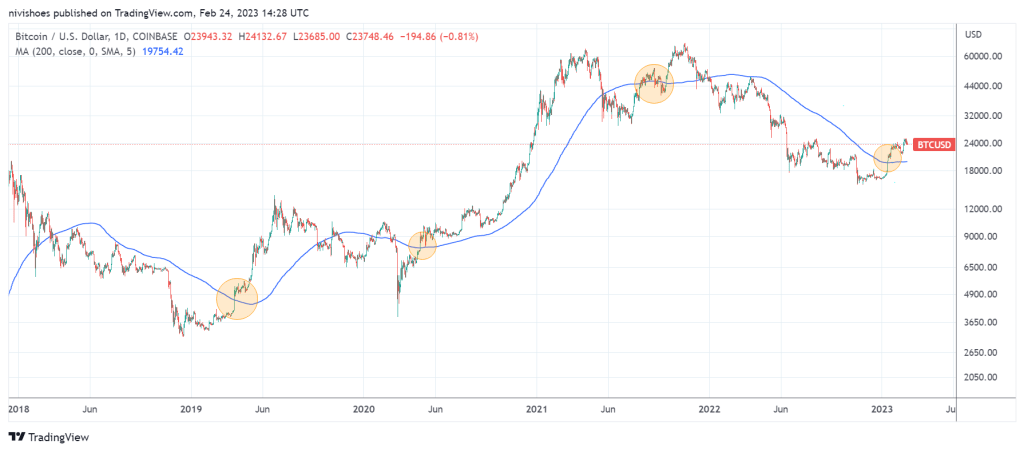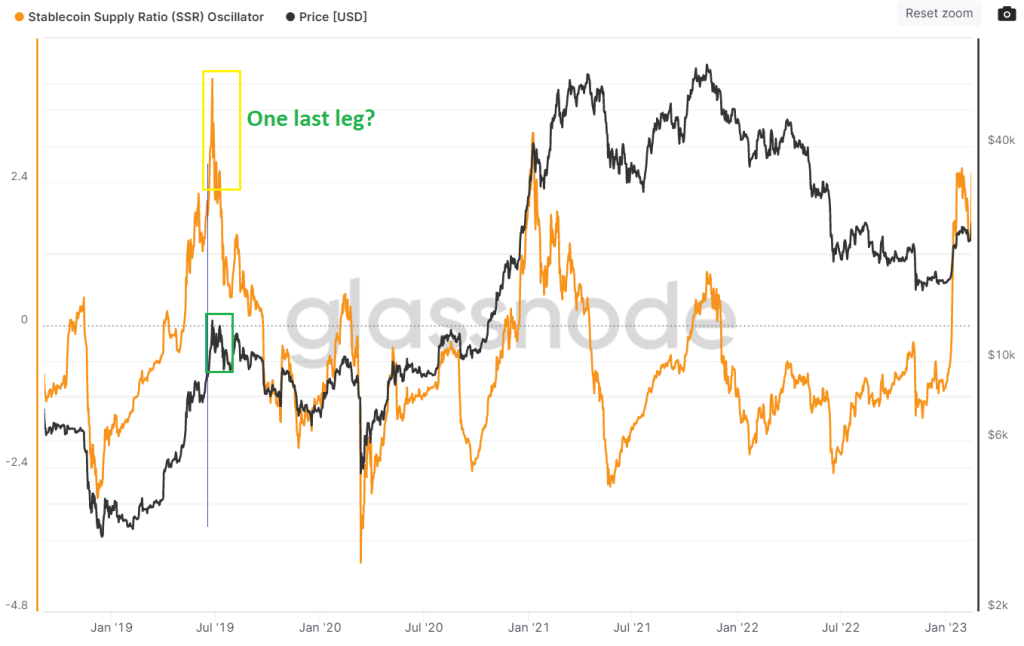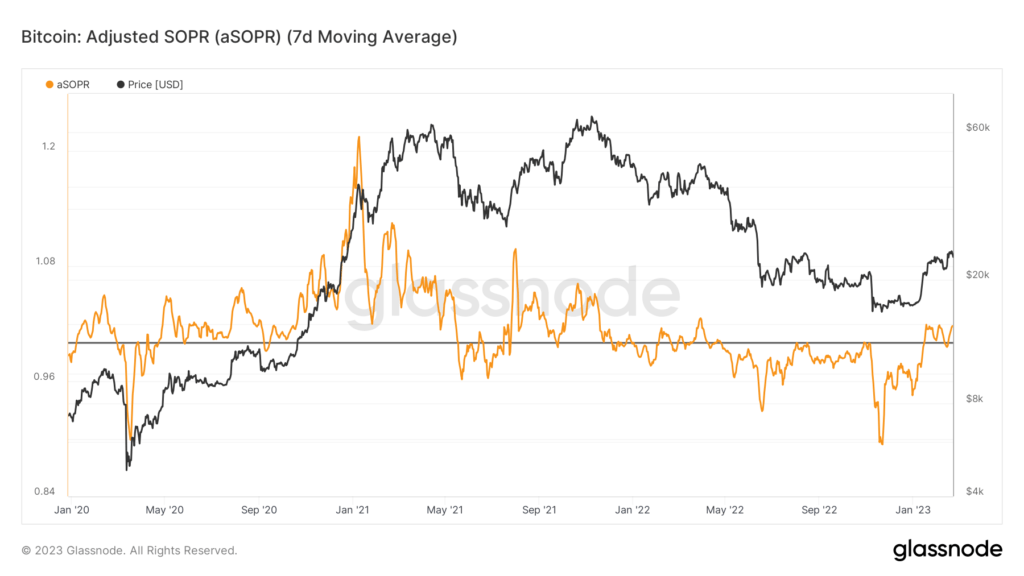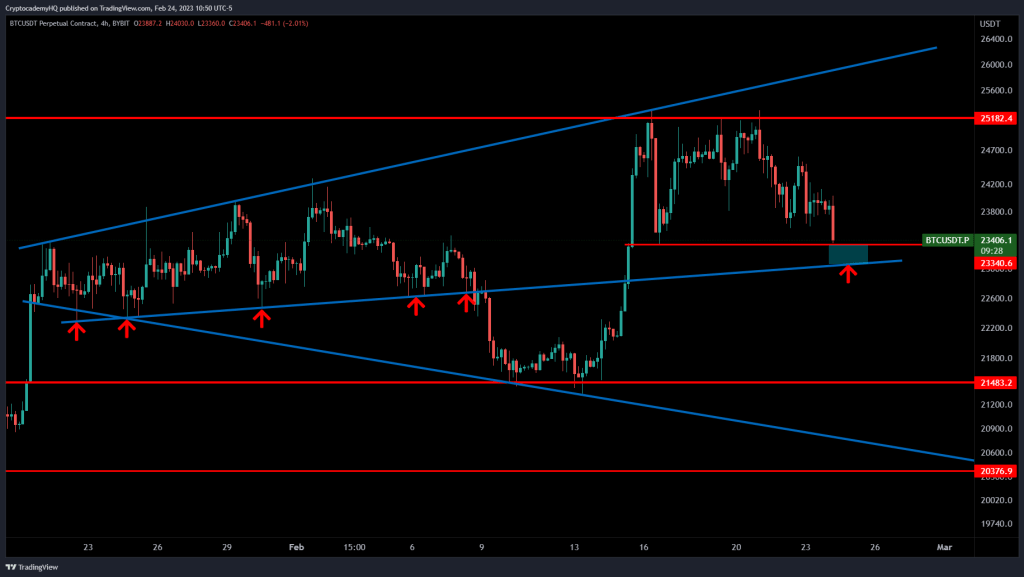Examining Bitcoin on-chain data highlights key similarities between the 2019 and 2023 BTC price rally.
Will the Bitcoin rally continue?
Bitcoin’s recent price rally from $16,500 to $25,000 can be attributed to the short-term contraction in the futures market and recent macroeconomic developments. However, data shows that many interested buyers (including whales) are being left on the sidelines as prices rise.
The recent rally to $25,000 shared many similarities with the 2019 bear market rally, which saw the Bitcoin price increase 330% from the November 2019 low of $3,250 to around $14,000. Recently, the BTC/USD pair has risen 60% from its November 2022 low.

On-chain and market indicators for the 2019 rally are sending mixed signals as to whether the Bitcoin rally will continue. Still, there are strong reasons to believe that the market has reached a crucial turning point where it could turn into a full-fledged bull market or revert to a long-term downtrend.
Bitcoin tackles historic trading levels
Bitcoin’s price has surpassed the 200-day moving average (MA) at $19,600, which could encourage paper traders looking to open a long position. Historically this metric has acted as a bullish-bear pivot line, with breakouts above it showing a bullish trend and vice versa.
BTC/USD usually retests the 200-day MA on a breakout, which raises the possibility of a correction towards $19,500. However, this was not the case in 2019, when the price continued to rise without retracing to the 200-day MA.

At the same time, traders are probably paying attention to the 200-period weekly moving average at $25,100. Bitcoin price had never dropped below the 200-week MA until November 2022, and a recovery of that level might encourage technical buyers to join the bandwagon.
However, traders can remain on the sidelines until a breakout occurs. Funding rates for permanent swap contracts are currently neutral, indicating that traders are awaiting approval. Cryptocurrency trader Immortal has found that the market is only at the ‘half point’ given the duration of the current rally compared to 2019. While the 2019 rally lasted 193 days from the bottom up, only 92 days have passed since the bottom on November 9, 2023. Immortal continues to say that if the 2019 timeline fractal holds up in 2023, the BTC/USD pair could rally as high as $46,000 by March.
Stablecoin supply rate oscillator near 2019 peak
Bitcoin’s stablecoin supply rate (SSR) oscillator measures the purchasing power of the market. The indicator measures the ratio between Bitcoin’s market cap and the stablecoin supply. Low readings on the SSR oscillator indicate higher purchasing power of stablecoins. Conversely, an increase in the metric indicates overbought conditions.
Bitcoin’s price surge in February 2023 saw the SSR oscillator rise to levels not seen since 2019 and 2021. The indicator shows that the positive trend may end soon. There is a small chance for a final push towards the $30,000 psychological level.

However, the data may be a bit dubious due to regulatory restrictions on the BUSD stablecoin, which has caused a significant drop in its supply. It may have tilted the SSR oscillator to indicate overbought conditions.
One of the biggest concerns of the current surge is the lack of whale uptake. Unlike in 2019, the number and ownership of BTC addresses holding more than 1,000 BTC increased as the price bottomed out and whales were selling at the current rally. The difference between the number of whales and the price raises concerns about the sustainability of the positive trend.
Data highlights an important bullish bear pivot point
Traders contribute to their winning positions on retracements in an uptrend, which is shown when the Output Profit Ratio (SOPR) indicator stays above one. The opposite happens in a downtrend where bears dominate the market by selling on rallies. A crossover of the metric above 1 is a potential trend reversal signal.
The 7-day moving average of Glassnode’s adjusted SOPR indicator shows that the bearish trend is likely reversing. The indicator turned bullish when BTC broke above $20,800 in January 2023. The metric has retested the key support level with Bitcoin’s price at $21,800, making it a crucial support level for a sustained uptrend.

Similarly, the price has risen above the average buying levels of both short-term and long-term holders, another sign of a potential trend reversal. This could be a sign that the market has reached an important turning point as the on-chain oscillators are returning to balance.
The measurements also indicate that a potential bullish trend looks likely as the price stays above the $21,800, $20,800 and $19,600 supports. A weekly close above $25,100 might encourage derivatives and technical traders to enter the current rally, but there are some warning signs that the market may reach overheated conditions and a quick correction towards lower support levels cannot be ignored.
BTC level to hold
The crypto analyst underlines the price level that Bitcoin (BTC) bulls must hold as the crypto markets rise. Analyst Justin Bennett tells his 111,400 Twitter followers with BTC trading at $23,984 at the time of writing, that Bitcoin bulls should hold $23,000.

The trader is also breaking the US Dollar Index (DXY), a measure of the strength of the US dollar against a basket of assets, in this case cryptocurrencies. Generally speaking, a stronger DXY means weaker assets and vice versa. According to Bennett, DXY is currently testing a new higher level.
Looking at the traditional stock index S&P 500 (SPX), Bennett says it’s not surprising that DXY is testing a higher high as SPX approaches a support point. Bennett also explains in a follow-up how the next big move for risky assets is tied to SPX.







